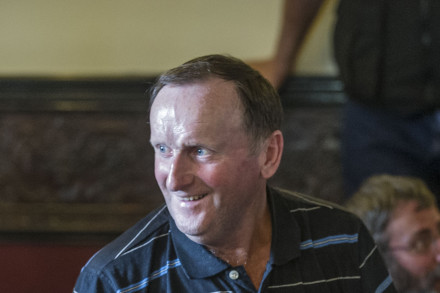Interviewer: Ben Stephenson for National Library of Australia
Jimmy Mullarkey is never happier than when playing his accordion.
I love playing for the dances, just playing for dances or sitting in the pub having a session and a few beers that’s what I like … I wouldn’t be into the competition stuff or anything like that.
One of Jimmy’s favourite places in the past for a session was in the back room of the St Alban’s pub during the St Alban’s Folk Festival, until that event became too crowded and perhaps lost a bit of its informal atmosphere. Living today on the central coast of New South Wales he hosts his own group of musicians – the Jimmy Mullarkey Céilí Band – and they can be heard accompanying dances at places like the Gaelic Club in Sydney.
For Jimmy the musical life began back in south Sligo where he was born into a family of 13 in 1954. They were a farming family running sheep in the mountains, growing their own vegetables and spuds, while his mother produced home made jams as well as delicious apple and rhubarb tarts. It was a life of modest self-sufficiency, one where the family helped around the house and Jimmy can recall long days in the hills looking after the sheep.
But what really brought the family together was the music. Jimmy’s father played the fiddle and tin whistle and would often of an evening get them all up for well known set dances such as the ‘Siege of Ennis’ or the ‘Walls of Limerick’. Jimmy borrowed an old accordion from his sister, and eventually a brother brought him home his own instrument from England. So began a lifetime of picking up and playing tunes by ear, along with a helping hand and encouragement from his musical parents to learn how to play. Jimmy remembers many happy times when the big family would all sit down and make music together, and one of his most poignant memories is playing his accordion with his dying father:
… in fact the last tune I played with him was a couple of weeks before he died, he died of cancer … and I went home from here when he was dying and he decided to get the fiddle down and play a few tunes and we played a couple of tunes and he said ye can pack that away now I won’t be needing it any more, so two weeks later he was gone.
Jimmy couldn’t wait to leave the National School at Cloonacool and work on the farm with his father. It was a time in the mid-1960s when traditional Irish music was less in vogue than it is now, when the mighty show bands of Ireland ruled the scene, and everyone locally was into the latest dance craze. He went to London simply to earn the money to buy a car, and never went home. At places like the White Hart at Fulham and the Camden Irish Centre Jimmy encountered and listened to some of the top Irish musicians of the day, slowly improving his own skills on an accordion which he acquired for 50 Pounds in a second hand shop. In the British capital emigration advertisements promising the ‘outback’ life in the open air and cattle droving lured him to Australia, and he landed in Sydney in 1974 where he found work within a week with an Irish construction company. Music, however, soon drew him into the city’s Irish scene, such as it was at that time, in the Gaelic Club in Devonshire Street:
… [it] was the only place to go then, there was no Irish pubs around as such back then like there is nowadays … everything centred around the Gaelic Club … and it used to be chock a blocked every night of the week … upstairs and downstairs the both, you used to have a dance downstairs Friday, Saturday and Sunday nights, there’d be a band playing there, and there’d be a band playing upstairs as well and you’d kind of go between the two … only place you could go to try and chase a few women.
In those far off 1970s and early 1980s, there was not much Irish music in Sydney, and Jimmy used to travel once a year to Melbourne to listen to the players gathered around the Fitzgerald brothers, Paddy and Joe. There were legendary sessions at the Daniel O’Connell and Clifton Hill pubs. Gradually, as Jimmy’s playing ability grew, the scene began to develop in Sydney, and he was a part of that until a bad back led to an enforced period of inactivity. As Jimmy took up the playing again, he was asked to put a group of musicians together to play for the set dance teaching sessions, being conducted by a well known teacher out from Ireland, Gerard Butler, at the Harp Hotel in Tempe. The group also played for Céilís at the venue and from these sessions evolved the Jimmy Mullarkey Céilí Band, still going strong today. The band plays at venues throughout the state and, most recently, in October 2014 could be found providing all the music for the Canberra Irish Set Dancing Weekend. One senses that Jimmy will keep playing for the dancers for as long as he has the strength. As he says of the old days, when he was learning and playing at places like the Bald Faced Stag and the Bristol Arms pubs in Sydney:
… we were only in it for the enjoyment of the music and if you got a few bob for it all the better.

